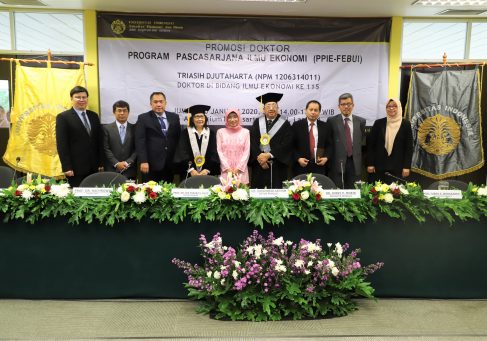Triasih Djutaharta Researches the Impact of Price and Social Environment on Consumption of Cigarettes, Food, Household Nutrition
Nino Eka Putra ~ Humas FEB UI
DEPOK – Postgraduate Program in Economics, Faculty of Economics and Business, University of Indonesia held an open session of Doctoral Promotion Triasih Djutaharta (1206314011) which took place at the Postgraduate Auditorium, Postgraduate Building, Friday (10/1/2020).
The Doctoral Promotion Session was chaired by Prof. Dr. Ine Minara S. Ruky with the supervisor, Prof. Nachrowi Djalal Nachrowi, Ph.D. (Promoter), Prof. Aris Ananta, Ph.D. (Co-Promoter 1), and Drajat Martianto, Ph.D. (Co-Promoter 2). As the testing team, Sugiharso Safuan, Ph.D. (Chief Examiner), Jossy P. Moeis, Ph.D., Turro S. Wongkaren, Ph.D., Dr. Sartika Djamaluddin, and Wahyu Prasetyawan, Ph.D.
The dissertation raised by Promovendus, entitled “The Impact of Cigarette Prices and the Social Environment of Smoking on Cigarette Consumption, Food and Household Nutrition in Indonesia”. This study assesses the effect of cigarette prices and smoking information on the demand function of cigarettes, food, and their implications for household nutrition.
In order to understand the process of transmission from the price of cigarettes to the reallocation of expenditure and changes in consumption between commodities consumed by households, he uses the Almost Ideal Deman System (AIDS) model and to assess the nature of the demand function, the estimation uses boundary regression.
The main data used in this model are the 2014 Social and Economic Survey and supporting data derived from the 2013 Basic Health Research and the 2014 Rural Area Potential. In the estimation model, food is classified into eight groups.
Estimated demand for each commodity for households that do not consume cigarettes is done using the Invers Mills Ratio (IMR) method. The price is proxy from the unit value that has been corrected by releasing the non-value factor. Non-value factors include household characteristics and accessibility of food availability.

“The result is, first, an increase in cigarette prices will increase the share of household expenditure on cigarettes and reduce the majority of food groups and in turn will reduce household consumption of protein and calories. Second, that an increase in the social environment of the prevalence of smoking will increase the share of household expenditure on cigarettes,” said Triasih Djutaharta.
“On the other hand, the social environment that restricts smoking, that is the Smoking-Free Area Policy, will reduce the possibility of smoking participation and also reduce the share of household expenditure on cigarettes,” he concluded.
Thus, the Leadership Council of the open session of doctoral promotion decided, Triasih Djutaharta (1206314011) was declared to graduate with the title of Satisfaction and succeeded in getting the 115th Doctoral degree in Economics. Congratulations to Dr. Triasih Djutaharta! (Des)













